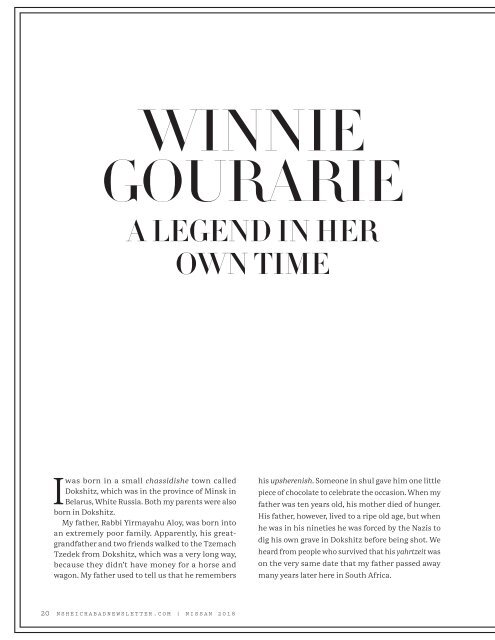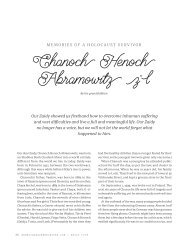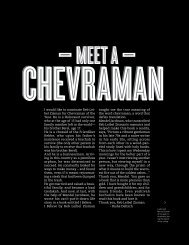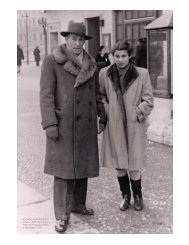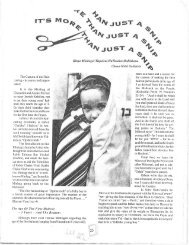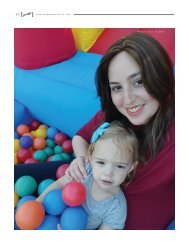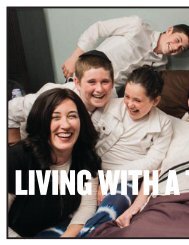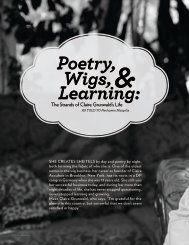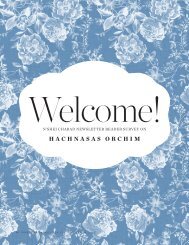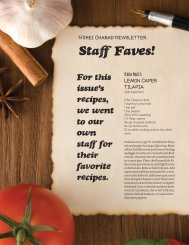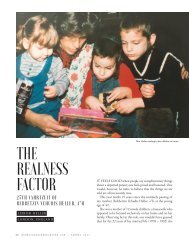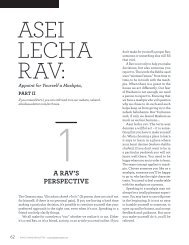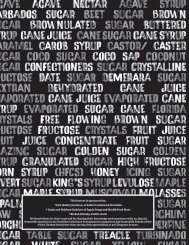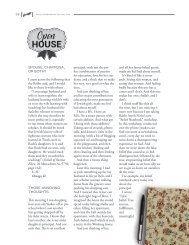Gourarie
Create successful ePaper yourself
Turn your PDF publications into a flip-book with our unique Google optimized e-Paper software.
WINNIE<br />
GOURARIE<br />
A LEGEND IN HER<br />
OWN TIME<br />
I<br />
was born in a small chassidishe town called<br />
Dokshitz, which was in the province of Minsk in<br />
Belarus, White Russia. Both my parents were also<br />
born in Dokshitz.<br />
My father, Rabbi Yirmayahu Aloy, was born into<br />
an extremely poor family. Apparently, his greatgrandfather<br />
and two friends walked to the Tzemach<br />
Tzedek from Dokshitz, which was a very long way,<br />
because they didn’t have money for a horse and<br />
wagon. My father used to tell us that he remembers<br />
his upsherenish. Someone in shul gave him one little<br />
piece of chocolate to celebrate the occasion. When my<br />
father was ten years old, his mother died of hunger.<br />
His father, however, lived to a ripe old age, but when<br />
he was in his nineties he was forced by the Nazis to<br />
dig his own grave in Dokshitz before being shot. We<br />
heard from people who survived that his yahrtzeit was<br />
on the very same date that my father passed away<br />
many years later here in South Africa.<br />
20 NSHEICHABADNEWSLETTER.COM | NISSAN 2018
NISSAN 2018 | NSHEICHABADNEWSLETTER.COM 21
1<br />
2<br />
1<br />
3 4<br />
5<br />
6<br />
1<br />
7<br />
(1) L-R: Shlomo, Michoel, Rochel Leah, Shaina. Michoel’s wife passed away and he never remarried. (2) L-R: Winnie’s mother-in-law Baila <strong>Gourarie</strong>, Winnie, and<br />
Winnie’s mother Rochel Leah Aloy in Eretz Yisroel after the engagement of Winnie and Sholom Ber. (3) Winnie with her mother Rochel Leah Aloy in Dokshitz.<br />
(4) Winnie and her mother Rochel Leah. (5) Winnie Aloy <strong>Gourarie</strong>’s two zaides. With the white beard: Reb Michoel Rivkind, her maternal grandfather, who<br />
turned white overnight at a young age when he was arrested by the communists for having a cheder in Dokshitz. Her paternal zaide, Reb Avrohom Moshe<br />
Aloy, was forced by the Nazis to dig his own grave when he was over 90 years old. (6) Winnie and her father Reb Yirmiyeh Aloy after they first moved to South<br />
Africa. Winnie was five years old (1939). (7) Yirmiyeh and Rochel Leah Aloy (nee Rivkind) at their tena’im.<br />
M<br />
y mother’s family was a<br />
little better off than my<br />
father’s. My maternal<br />
grandfather, Michoel Rivkind, was<br />
a melamed, and he had a cheder<br />
in his home. My mother was the<br />
oldest of three children and she<br />
lost her mother to smallpox when<br />
she was nine. My grandfather never<br />
remarried, and he taught my mother<br />
to run the house at a very young age.<br />
He was a colorful character and an<br />
excellent teacher. He used to say that<br />
if he taught the wall and the wall<br />
didn’t understand, it was his fault!<br />
He was known to be able to “shprech<br />
op ahn ayin hora” – to get rid of the<br />
evil eye. Apparently his technique<br />
worked! One day a man woke him up<br />
at three in the morning, crying that<br />
his horse was sick and he needed an<br />
urgent remedy. He begged him to get<br />
rid of the evil eye for his horse. My<br />
grandfather was so aggravated to be<br />
woken at such a ridiculous hour for<br />
a horse that he told the man that he<br />
couldn’t do it because he didn’t know<br />
the horse’s mother’s name!<br />
Because my father’s family was so<br />
poor, when his mother passed away<br />
he had to leave the cheder where<br />
he learned and help to support<br />
the family. At first he became a<br />
messenger for a bank, and later he<br />
studied and became a bookkeeper. He<br />
learned to read the Torah, and a Rov<br />
in Dokshitz told him that if he came<br />
to him every Shabbos morning he<br />
would test his leining and he would<br />
give him a bun and a glass of milk.<br />
He therefore worked very hard at<br />
this skill and eventually became an<br />
outstanding baal koreh.<br />
Before the war there were five<br />
shuls in Dokshitz. Four of them<br />
were chassidishe shuls and one was a<br />
misnagdishe shul. Of the chassidishe<br />
shuls, one was a “tailors’ shul,” where<br />
all the tailors used to congregate.<br />
Another was a “shoemakers’ shul,”<br />
and other tradesmen had their own<br />
shuls too. The Rov of the chassidishe<br />
community in Dokshitz was Reb Leib<br />
Sheinin Hy”d. It was said that the<br />
22 NSHEICHABADNEWSLETTER.COM | NISSAN 2018
Rebbe Rashab called him a beinoni<br />
of the Tanya. He was a big oved and<br />
davened for hours. Unfortunately,<br />
when the Nazis, yemach shemom,<br />
came to Dokshitz, they collected<br />
all the Jews of the town and herded<br />
them all into the shul where Reb<br />
Leib Sheinin was in the middle of<br />
davening Shacharis. Then<br />
they set the shul on fire. The<br />
people panicked and many<br />
became hysterical. When<br />
Reb Leib realized what was<br />
happening, he made an<br />
announcement: “Yidden, we<br />
are going to be korbonos. But<br />
a korbon with a mum [defect]<br />
is not accepted Above. So we<br />
have to be b’simchah! We have<br />
the zchus to be moser nefesh for<br />
being Yidden, let’s not lose our<br />
heads!” He then began dancing<br />
and singing the niggun of<br />
hakafos. The Nazis became so<br />
angry at this that they killed<br />
him before they burned down<br />
the shul with most of the<br />
Jews in it. (The story is known<br />
because there were some<br />
men hidden in a crawl space<br />
under the shul who survived<br />
and brought the story to<br />
America, where they told it to<br />
several people including Reb<br />
Yochanan Gordon.)<br />
MY FATHER’S LIFE IN YESHIVA<br />
At the age of 14, my father,<br />
Yirmiyahu Aloy, left Dokshitz<br />
and went to Vilna to look for<br />
employment. Although he<br />
was very bright and talented, he<br />
never thought he would have the<br />
opportunity to go to a yeshiva. In<br />
Vilna he met a friend who introduced<br />
him to one of the Ramim—lecturers—<br />
in the Ramailes Yeshiva. When this<br />
man heard my father’s story he<br />
offered to look after all his physical<br />
needs if he joined the yeshiva. My<br />
father grabbed the opportunity and<br />
never looked back. The president of<br />
the Ramailes Yeshiva was the famous<br />
Rabbi Chaim Ozer Grodzinsky. My<br />
father, being an excellent baal koreh,<br />
earned pocket money from reading<br />
He begged him<br />
to get rid of<br />
the evil eye for<br />
his horse. My<br />
grandfather was<br />
so aggravated to<br />
be woken at such<br />
a ridiculous hour<br />
for a horse that he<br />
told the man that<br />
he couldn’t do it<br />
because he didn’t<br />
know the horse’s<br />
mother’s name!<br />
the Torah in Vilna. He also served as<br />
a baal tefillah and a baal tokeah in<br />
one of the local shuls. When Rabbi<br />
Grodzinsky became old and frail,<br />
there was a minyan in his home on<br />
the days that the Torah was read<br />
and my father was the baal koreh.<br />
One time, on Rosh Chodesh, Rabbi<br />
Grodzinsky sent my father to the<br />
amud to daven shacharis and hallel<br />
and then he read from the Torah as<br />
usual. After that Rabbi Grodzinsky<br />
insisted that my father continue<br />
with musaf. After davening, Rabbi<br />
Grodzinsky went up to my father, put<br />
his hand on his shoulder and<br />
said, “Du kenst shein zein a Rov<br />
in America”—you can already be<br />
a Rabbi in America. My father<br />
loved to joke that he had<br />
“semichah” from Rabbi Chaim<br />
Ozer Grodzinsky!<br />
After the Ramailes<br />
Yeshiva, my father went to<br />
the Slonimer Yeshiva. The<br />
Rosh Yeshiva there was Rabbi<br />
Shabsi Yogel. His father-inlaw<br />
was a very wealthy man<br />
who only had daughters, so he<br />
hired a melamed to teach his<br />
daughters Torah. As a result,<br />
Rebbetzin Yogel, who was very<br />
bright, became a lamdanis in<br />
her own right. She could learn<br />
like a man.<br />
My father was often a<br />
guest at the Yogels’ Shabbos<br />
table, together with some<br />
friends. One time one of his<br />
friends complimented the<br />
rebbetzin on the delicious<br />
food. The rebbetzin thanked<br />
him and asked, “Why are you<br />
so surprised? When I put my<br />
head into the pot it must be<br />
good!” I merited to spend three<br />
weeks in the home of Rabbi<br />
and Rebbetzin Yogel in Eretz<br />
Yisroel after I finished school.<br />
After I was married and my husband<br />
and I went to Eretz Yisroel for a trip<br />
I introduced my husband to them.<br />
They were absolutely thrilled with<br />
my choice.<br />
Eventually Rabbi Yogel sent a<br />
group of bachurim to the prestigious<br />
NISSAN 2018 | NSHEICHABADNEWSLETTER.COM 23
8<br />
(8) Wedding of Sholom Ber and Winnie <strong>Gourarie</strong>.<br />
Yeshiva of Mir. My father was one of<br />
them and he was known there as<br />
Reb Yirmiya Dokshitzer. The Mirer<br />
Yeshiva was very strict about seder,<br />
orderliness. When a student arrived<br />
in the Yeshiva he had to have a<br />
special loop sewn on his coat in<br />
order to hang it on a hook assigned<br />
to him. Underneath his coat he had<br />
to put his galoshen (rain boots) tidily.<br />
For untidiness a student would be<br />
fined a certain amount that he had<br />
to donate to the library. I think<br />
that in addition to all the Torah<br />
that my father learned in the Mir—<br />
and my father was a well-known<br />
talmid chacham—he acquired his<br />
organizational skills there. He was<br />
always super organized!<br />
MY PARENTS GET MARRIED<br />
In the year 1931, at the age of 21,<br />
my father became engaged to my<br />
mother, Rochel Leah Rivkind, his<br />
neighbor from Dokshitz who was<br />
two years older. My father came<br />
home from the Mir but there was a<br />
problem. My grandfather Michoel did<br />
not allow them to get married until<br />
my father got smichah. However, my<br />
father was too shy to go back to the<br />
Mir as a chassan at such a young age<br />
to continue learning there. At that<br />
time in Mir there were bachurim of<br />
35 and 40 who were still learning and<br />
not thinking of marriage and here<br />
he was, extremely young and already<br />
engaged. The mashgiach of the Mir,<br />
however, sent him a postcard asking<br />
him to come back to the yeshiva to<br />
learn and not to be embarrassed. But<br />
because of problems with the army<br />
which prevented him from returning<br />
to the Mir, he went to study at the<br />
Lomze Yeshiva, where he eventually<br />
got smichah and received kabbalah to<br />
be a shochet.<br />
In the year 5694 (1933), my parents<br />
got married in the courtyard of<br />
the shul, on a freezing cold Friday<br />
afternoon. They moved into my<br />
grandfather Michoel’s house in<br />
Dokshitz. Their best friends were<br />
the Gordon family: Reb Yochanan<br />
Gordon, his wife Zisha and their<br />
children. My father’s best friend was<br />
Reb Nison Gordon, the oldest of Reb<br />
Yochanan’s children. They remained<br />
best friends for the rest of their lives.<br />
My father used to tell us about<br />
Reb Yisroel Gordon, Reb Yochanan’s<br />
father. He was the shochet in Dokshitz<br />
and was also an expert baal koreh. He<br />
taught many people in Dokshitz to<br />
lein but he himself only sometimes<br />
leined on a Monday or a Thursday, but<br />
never a whole parshah on a Shabbos<br />
or a Yom Tov. People asked him why<br />
and he answered with typical Gordon<br />
wit, “Because I can’t lein very well. I<br />
didn’t learn by Yisroel the shochet!”<br />
24 NSHEICHABADNEWSLETTER.COM | NISSAN 2018
9 10<br />
(9) Esther Sternberg and her father Zalman <strong>Gourarie</strong>; Sholom Ber<br />
and Winnie <strong>Gourarie</strong>. (10) Tena’im of Sholom Ber and Winnie <strong>Gourarie</strong><br />
in the home of Tema and Nosson <strong>Gourarie</strong> in Crown Heights. Notice<br />
the candles, bent over from the heat. Standing L-R: Shirley Levitin,<br />
Rita Golshmid, Esther Wineberg, Chava <strong>Gourarie</strong>, Esther Sternberg<br />
(12 years old), Zelda Raskind, Batsheva Rosen, Tema <strong>Gourarie</strong>, and<br />
Tema Althaus. Seated, L-R: Kaila Rothstein, Rebbetzin Mindel Katz or<br />
Rebbetzin Gittel Mentlick, Winnie, Rochel Leah Aloy, Zisha Gordon,<br />
Bunya Haskind. (11) Wedding invitation of Yirmiyahu and Rochel Leah<br />
Aloy (1933).<br />
11<br />
The friendship between my family<br />
and the Gordon-Goldman family<br />
continues until this day.<br />
My father saw the Frierdiker<br />
Rebbe five times. As a bachur he<br />
once helped out at the secretariat of<br />
Lubavitch in a town called Gleboka.<br />
There he met the Rebbe, who was<br />
then known as the Ramash, for the<br />
first time. The Rebbe asked him<br />
where he was learning and he said<br />
that he was learning in the Mir. The<br />
mashgiach in the Mir at the time was<br />
Reb Yerucham. The Rebbe asked my<br />
father to say over a mussar vort from<br />
Reb Yerucham, which he did.<br />
Although my father always learned<br />
in Litvishe yeshivas and was exposed<br />
to the Litvishe way of learning, he<br />
was a fully committed chossid and<br />
never did a thing without first<br />
consulting the Frierdiker Rebbe and<br />
then later the Rebbe for their consent<br />
and blessing.<br />
I was born on<br />
the 9 th Kislev<br />
5694 (November<br />
16, 1934) and was named Vichna after<br />
my maternal grandmother.<br />
In the winter of 5695, at the<br />
instruction of the Frierdiker Rebbe,<br />
a Lubavitcher Yeshiva was opened in<br />
the town of Gleboka and my father<br />
was appointed the Rosh Yeshiva.<br />
Unfortunately, the Yeshiva ran into<br />
financial difficulties and had to close<br />
after a year. Again with the blessing<br />
and consent of the Frierdiker Rebbe<br />
my father was appointed the shochet<br />
in the town of Druye. This was<br />
considered an important position<br />
and at this time he also received<br />
kabbalah from the mohel of Vilna<br />
to be a mohel. He circumcised many<br />
babies but sometimes after a bris if<br />
he heard the baby crying from the<br />
other side of the town he couldn’t<br />
sleep at night! (The town of Dokshitz<br />
was very small and the houses were<br />
close to each other, so one could hear<br />
other people’s babies crying at night.)<br />
SETTLING IN SOUTH AFRICA<br />
In 1937, people were beginning to<br />
realize that Eastern Europe was no<br />
longer safe. My mother’s brother<br />
and sister were both in South Africa<br />
so my father decided to go to South<br />
Africa. Rabbi Chaim Ozer Grodzinsky,<br />
whose brother-in-law was the senior<br />
Rabbi in Johannesburg, managed to<br />
get him the necessary documents<br />
and to pay for his trip. He became a<br />
meshulach for a Yeshiva in Brisk. He<br />
was not exactly cut out for the job<br />
because he managed to raise only<br />
enough money to pay for his trip but<br />
no more! He arrived in South Africa<br />
in 1937, leaving my mother and me<br />
NISSAN 2018 | NSHEICHABADNEWSLETTER.COM 25
ehind. The plan was that he would<br />
work and collect enough money to<br />
send us tickets to follow him. His first<br />
job was at a shul in a small town close<br />
to Johannesburg, called Boksburg. At<br />
that time, Yiddishkeit in South Africa<br />
was such that on Rosh Hashanah<br />
when a man was called to the Torah<br />
and got an aliyah, he gave a donation<br />
to the shul; the amount that was<br />
pledged was written down, then and<br />
there! My father was so astounded<br />
that after Yom Tov he wrote a letter<br />
to his father saying that for the first<br />
time in his life he had witnessed<br />
“B’Rosh Hashanah tikoseivun!”<br />
He did not stay in Boksburg for<br />
long. His next job was also in a small<br />
town called Benoni (reportedly given<br />
this Hebrew name, which means “son<br />
of my affliction,” by the surveyor,<br />
who endured much distress trying<br />
to establish the boundaries of this<br />
town). Here there was a warm,<br />
heimishe community and my father<br />
Mrs. Winnie <strong>Gourarie</strong> during her interview<br />
with the N’shei Chabad Newsletter.<br />
made life-long friends there. I am<br />
still friendly with some of their<br />
descendants to this day.<br />
It took two long years until my<br />
father was able to bring us out to<br />
join him in South Africa, and it<br />
was only in August 1939, two weeks<br />
before World War II broke out, that<br />
my mother, my grandfather and I<br />
landed in Cape Town from the very<br />
last boat to enter the country. The<br />
boat, named the Warwick Castle, was<br />
sunk by the Germans on its way back<br />
to London.<br />
We made our home in<br />
Johannesburg. I was already four and<br />
a half years old so my parents went to<br />
register me at a nearby kindergarten.<br />
When the teacher asked for my name<br />
and was told that my name was<br />
Vichna she burst out laughing. “You<br />
can’t call her that in South Africa!<br />
Everyone will laugh. Let’s call her<br />
Winnie,” she told my mother. So<br />
Winnie it remained, and although<br />
my parents never gave<br />
up on “Vichnale,” I got<br />
used to Winnie and<br />
rather liked it.<br />
A SISTER IS BORN<br />
We settled in<br />
Johannesburg and<br />
I was very happy in<br />
kindergarten. When I<br />
was five and a half years<br />
old my sister Batya was<br />
born on a Shabbos in<br />
1940. The maternity<br />
hospitals in those days<br />
were very strict about<br />
visiting hours, but my<br />
father being a member<br />
of the clergy could enter<br />
at any time. Still, that<br />
Shabbos the nurses<br />
refused to allow him<br />
to see my mother and<br />
he didn’t even know<br />
whether she had given birth to a<br />
girl or a boy. At the hospital that day<br />
there were four other women who<br />
had given birth and they all had boys.<br />
When my father begged the nurses to<br />
tell him whether his wife had given<br />
birth to a girl or a boy, they told him<br />
that his wife had given birth to a boy.<br />
The excitement was great! He<br />
ran straight back to shul and told<br />
everyone the good news. He arranged<br />
a shalom zachar and even a bris for<br />
the following Shabbos, and straight<br />
after Shabbos he went with a bunch<br />
of flowers to visit my mother during<br />
visiting hours. She heard him<br />
speaking to the nurses and presumed<br />
that they told him that his newborn<br />
baby was a girl. She decided to fool<br />
him and tell him that the nurses<br />
made a mistake and that he really<br />
has a son! When she told him this,<br />
he replied that he already knew<br />
that he had a son. After a while she<br />
realized that he was serious, so she<br />
told him the truth! Can you imagine—<br />
he now had to face all his friends<br />
and acquaintances, cancel the bris<br />
and tell me that I now had a sister<br />
and not a brother. I believe I did not<br />
accept this so easily and I had to be<br />
persuaded that a sister is just fine.<br />
My father, with his wonderful<br />
sense of humor, told this story at<br />
my sister’s wedding, emphasizing<br />
the fact that he was so happy he had<br />
two daughters because at that time,<br />
without a Jewish school or a Yeshiva<br />
in South Africa, and travel being out<br />
of the question, he and my mother<br />
could never have raised a son of the<br />
calibre of his two illustrious sons-inlaw.<br />
My brother-in-law, Rabbi Moshe<br />
Kurtstag, is the Rosh Beis Din of the<br />
whole of the united community<br />
of South Africa, and my husband,<br />
although he was a businessman,<br />
was a talmid chacham of note and a<br />
devoted chossid of the Rebbe.<br />
26 NSHEICHABADNEWSLETTER.COM | NISSAN 2018
My elementary school was called<br />
“Jewish government.” The only thing<br />
Jewish about it was that it was<br />
closed on all Jewish holidays. Then<br />
I attended Athlone High School, a<br />
public school where the student body<br />
was 95% Jewish. For limudei kodesh<br />
we all attended an afternoon cheder.<br />
I had a very happy childhood. I used<br />
to ride my bicycle to school and to<br />
cheder and I had lots of friends.<br />
A VISIT TO THE FRIERDIKER REBBE<br />
In 1948, when I was 14 years old, my<br />
father heard that his half-sister Bat<br />
Sheva Rosen had had a heart attack.<br />
He had never met her, so he decided<br />
to fly to America to be with her and<br />
at the same time see the Frierdiker<br />
Rebbe, whom he had not seen since<br />
leaving Eastern Europe. Bat Sheva<br />
recovered well and my father was<br />
able to reconnect with his dear friend<br />
Reb Yochanan Gordon and his family.<br />
Reb Yochanan was already the gabbai<br />
at 770, a position he held for many<br />
years. It was Shavuos time and the<br />
Rebbe had a minyan outside his room<br />
as he was unable to go downstairs.<br />
Reb Yochanan arranged for my father,<br />
who was an expert baal koreh, to lein<br />
at the Rebbe’s minyan. Afterwards the<br />
Rebbe told Reb Yochanan that he<br />
recognized the voice and knew who<br />
had leined, even though he hadn’t<br />
seen him for all those years.<br />
At that time it was very difficult<br />
to understand the Rebbe’s speech.<br />
Whoever went in for yechidus had<br />
to go in with the Rebbe’s secretary<br />
who was able to understand what<br />
the Rebbe was saying. My father<br />
refused to have the secretary go in<br />
with him. He maintained that he<br />
would understand every word the<br />
Rebbe would say and he did. It was<br />
at this time that there were elections<br />
in South Africa and the Nationalists—<br />
the Afrikaner party—won the<br />
elections. Everyone thought that this<br />
would be disastrous for the Jews and<br />
they anticipated another Holocaust.<br />
During yechidus my father asked the<br />
Rebbe whether he should perhaps<br />
bring his family to America. With a<br />
big smile on his face the Frierdiker<br />
Rebbe told my father, “Fort aheim”—go<br />
back home! This was the beginning of<br />
the apartheid era and although the<br />
blacks in South Africa were treated<br />
most unfairly, the Jews were not<br />
negatively affected.<br />
In my teenage years I joined the<br />
Bnei Akiva movement, which in<br />
those days was called Hashomer<br />
Hadati and was the only frum youth<br />
movement. I spent many happy years<br />
in the movement. I enjoyed camp<br />
every year and eventually became<br />
one of the leaders of Bnei Akiva.<br />
THE HISTALKUS<br />
During that time Rabbi Yosef<br />
Wineberg was a frequent guest<br />
in my parents’ home. He came to<br />
Johannesburg for a period of two<br />
to three months every two years. In<br />
1950, when I was 16, I came home<br />
from school one day and found our<br />
whole house in mourning. Rabbi<br />
Wineberg and my father were<br />
walking around in socks, crying, and<br />
my mother was beside herself. They<br />
had just received a telegram that<br />
the Frierdiker Rebbe was nistalek. I<br />
only heard after I was married that<br />
my brother-in-law, Rabbi Nosson<br />
<strong>Gourarie</strong> from Montreal, Rabbi Yoel<br />
Kahn, Mrs. Rivka Chitrik, and one or<br />
two others had boarded a boat from<br />
Eretz Yisroel to America to see the<br />
Rebbe and they knew nothing about<br />
the histalkus until they arrived in<br />
New York. Apparently, my husband’s<br />
brother-in-law, Rabbi Tzvi Brodie,<br />
saw the news in the Israeli press<br />
before they left, but he didn’t want<br />
to stop them from going, so he told<br />
no-one, not even my parents-in-law.<br />
Rabbi Wineberg remained in South<br />
Africa till after shloshim and on the<br />
Shabbos of shloshim he took a lot of<br />
mashke and farbrenged the whole day.<br />
My father helped Rabbi Wineberg<br />
a great deal, as he did for every<br />
meshulach, no matter for what cause<br />
they came to South Africa. My father<br />
collected all the pledges and did all<br />
the bookkeeping. Very few people<br />
donated to any cause unless my<br />
father sanctioned it. The Lubavitcher<br />
Yeshivas offered my father a ticket to<br />
the Rebbe for all his hard work, but<br />
he refused to accept. He said he didn’t<br />
want to sell his mitzvah!<br />
After I completed high school I<br />
attended the “Machon Lemadrichei<br />
Chutz La-aretz” in Eretz Yisroel—a<br />
leadership course for members of all<br />
the youth movements. Prior to my<br />
leaving for Eretz Yisroel, Rabbi Yisroel<br />
Hazdan arrived in South Africa with<br />
his first wife. He had connections<br />
with the Rebbeim in Eastern Europe,<br />
but his main connection was with<br />
the Frierdiker Rebbe in Latvia. He<br />
was offered a position in Sweden in<br />
about 1932 and he accepted. When<br />
the Frierdiker Rebbe passed through<br />
Sweden on the way to America,<br />
Rabbi Hazdan was the shochet for<br />
the Rebbe in Sweden. When Rabbi<br />
Hazdan’s wife became very ill, they<br />
were advised to relocate to a warmer<br />
climate and they chose South Africa.<br />
Before they arrived, the Frierdiker<br />
Rebbe wrote a letter to the senior<br />
Rabbi of South Africa, Rabbi Yitzchok<br />
Kossowsky, and asked him if he would<br />
please introduce Rabbi Hazdan to my<br />
father because my father was a “mufla<br />
b’ahavas Yisroel” – a “specialist” in<br />
ahavas Yisroel, and he would take<br />
care of him. My father and Rabbi<br />
Hazdan became firm friends from<br />
the day he arrived until they passed<br />
away. Rabbi Hazdan’s wife passed<br />
NISSAN 2018 | NSHEICHABADNEWSLETTER.COM 27
away soon after they arrived in South<br />
Africa and my father was mesader<br />
kiddushin at his second marriage to<br />
a charming and wonderful lady, Ella,<br />
with whom we all became close.<br />
After I returned from Eretz Yisroel<br />
I attended the Hebrew Teachers’<br />
Seminary here in Johannesburg<br />
and then went to teach in a town<br />
called Bloemfontein in the Orange<br />
Free State for a year. I also taught the<br />
Jewish boarders at Eunice Girls High<br />
School, some of whom I still see today<br />
in Johannesburg.<br />
While I was teaching in<br />
Bloemfontein I turned 19. My<br />
birthday that year coincided with<br />
the birthday of Winston Churchill.<br />
The South African papers were filled<br />
with the headlines, “Happy Birthday<br />
Winnie!” My father, who was the<br />
busiest man in Johannesburg but<br />
always had all the time in the world<br />
for his children and grandchildren,<br />
bought lots of newspapers, cut out<br />
these headlines, pasted them all over<br />
a big brown envelope and sent me a<br />
letter and a gift in this envelope.<br />
When I finished my year in<br />
Bloemfontein my parents decided<br />
that it was time I looked for a shidduch.<br />
There was no-one for me in South<br />
Africa so off I went to America with my<br />
mother, who suffered from scoliosis<br />
and thought that she would see a<br />
doctor in America at the same time.<br />
A TRIP TO AMERICA<br />
In 1955 my mother and I traveled<br />
to America by boat. We spent a week<br />
in London and then took the Queen<br />
Elizabeth to New York. I was so seasick<br />
that I couldn’t enjoy the luxury of<br />
that beautiful ship. Rabbi Wineberg<br />
arranged accommodations for us<br />
with a Rabbi and Mrs. Klein. I do not<br />
recall either of their first names, but<br />
Rabbi Klein was so tall that he was<br />
known as “der heicher Klein.”<br />
Soon after we arrived we had<br />
yechidus with the Rebbe. My mother<br />
and I went in separately. I weighed 92<br />
pounds at the time and I wore a black<br />
suit that made me look even thinner<br />
than I was. I was told afterwards that<br />
the Rebbe asked Rabbi Wineberg if<br />
I was healthy! The Rebbe asked me<br />
to sit several times, but of course I<br />
didn’t. Before I left South Africa I was<br />
given strict instructions on how to<br />
behave. Then the Rebbe asked me,<br />
“Vi gefelt eich America?”—How do<br />
you like America? I thought I must<br />
be truthful, so I said, “Es gefelt mir<br />
in gantzen nit”—I don’t like it at all!<br />
I think the Rebbe was amused. I<br />
went on to ask a few questions of<br />
a personal nature and the yechidus<br />
was over.<br />
Seeing that we arrived close to<br />
Pesach, my father arranged that we<br />
spend Pesach with his dear friend<br />
Reb Yochanan Gordon and his<br />
family. There I met my best friend<br />
Esther Goldman, the Gordons’ only<br />
daughter. Although she was several<br />
years older than me and was already<br />
married with two children, we hit it<br />
off immediately. We were two of a<br />
kind! She was already corresponding<br />
on her father’s behalf with my<br />
father and had sent him pictures of<br />
her handsome chassan and of the<br />
whole family at their wedding. She<br />
wrote beautifully. She had attended<br />
my Zeide’s cheder in Dokshitz and<br />
years later, during a visit to South<br />
Africa, she recognized him on the<br />
photograph in my lounge.<br />
When my mother and I came to<br />
New York, the Goldmans’ oldest son<br />
Yossy (now Rabbi Yossy Goldman,<br />
who is the Rabbi of the largest shul<br />
in Johannesburg) was five years old.<br />
He used to sit me down and say,<br />
“Winnie, talk!” He loved to listen to<br />
my South African accent. Esther and<br />
I corresponded for many years and<br />
I still have some of her letters. Our<br />
friendship with the Goldmans was<br />
warm and everlasting. When their<br />
children, Yossy and Rochel, arrived in<br />
South Africa as shluchim we kind of<br />
adopted them. We participated in all<br />
of their simchos and supported them<br />
whenever possible. In New York,<br />
Esther and Reb Shimon provided<br />
a home away from home for our<br />
children when they came to Yeshiva<br />
and school so far away from home,<br />
at a time when telephone calls were<br />
very few and far between. They only<br />
came home once a year. My children<br />
never had to call the Goldmans if<br />
they wanted a meal or just wanted<br />
to talk. They would just come by and<br />
relax, feeling very much at home.<br />
In the meantime, Rabbi Wineberg<br />
lost no time in getting to work. I had<br />
never seen a bachur with a beard in<br />
my life. To me a beard belonged on<br />
a mature Rabbi or an old man, so<br />
Rabbi Wineberg introduced me to<br />
quite a few boys without beards (in<br />
Lubavitch at the time there were<br />
many bachurim without beards). It<br />
didn’t work. I suppose that if I was<br />
destined to marry a chossid it had<br />
to be the authentic kind. So one<br />
day Rabbi Wineberg asked me, “How<br />
would you like to meet a bachur with<br />
a beard?” I thought this would be very<br />
interesting, and the rest is history.<br />
My future husband, Sholom<br />
Ber <strong>Gourarie</strong>, called me himself,<br />
introduced himself and said he would<br />
like to meet me. We spoke Ivrit and<br />
we spent a pleasant hour. But my<br />
husband had many doubts. Although<br />
he was interested, he felt he had to<br />
consult the Rebbe. What a privilege<br />
it was way back then when the Rebbe<br />
was there beguf and we could discuss<br />
anything and have complete clarity.<br />
My husband told the Rebbe that<br />
this girl that he met comes from<br />
South Africa and went to a public<br />
28 NSHEICHABADNEWSLETTER.COM | NISSAN 2018
co-educational school, her father<br />
doesn’t have a beard and she seems<br />
very far from the upbringing that he<br />
was used to—how can this work?<br />
What the Rebbe answered him<br />
remains a blueprint for my life<br />
from the day I got married. The<br />
Rebbe told him, “Nit nor vellen<br />
di inyonim fun Chabad ba ir zich<br />
opleigen nor di inyonim fun Shpitz<br />
Chabad.”—”Not only will the ideals<br />
and principles of Chabad be a given<br />
with her, but even the ideals of [those<br />
who have been part of Chabad for<br />
many generations].” And when my<br />
husband asked about the family, the<br />
Rebbe said, “Zei zeinen yirei Shomayim<br />
beteva.” – “They are G-d-fearing by<br />
nature.” I am forever still trying to<br />
live up to this incredible compliment<br />
that the Rebbe gave me.<br />
We got engaged on the 15 th of Av<br />
1955 and we had a tena’im catered<br />
by Mermelstein caterers in Rabbi<br />
Nosson and Mrs. Tema <strong>Gourarie</strong>’s<br />
home. They went out of their way to<br />
make it very beautiful. My mother<br />
insisted on china dishes and cloth<br />
serviettes. Who ever heard of paper<br />
plates and paper napkins in South<br />
Africa in those days?<br />
It was summer and the heat was<br />
unbearable. There was a beautiful<br />
candelabra with candles on the<br />
table, but we couldn’t light them. The<br />
candles drooped and melted. There<br />
was no air conditioning in private<br />
homes at the time. When my chassan<br />
and I went for a walk we had to go<br />
into a bank to cool off. Most people<br />
were in the country at the time and<br />
my good friend Esther Goldman was<br />
not at our tena’im. The Goldmans<br />
were at the same bungalow colony<br />
as Rabbi Nosson and Tema <strong>Gourarie</strong>.<br />
Being that Tema was a relative, she<br />
had to come to the tena’im and Esther<br />
was left to look after Tema’s children<br />
and her own! She was quite upset<br />
that she wasn’t there and so was I.<br />
When my mother and I arrived<br />
in America we were also privileged<br />
to visit the Rebbetzin Nechama<br />
Dina, wife of the Frierdiker Rebbe.<br />
It was a wonderful experience, but<br />
whatever we wanted to say we had<br />
to write on a pad of paper that was<br />
prepared on the table because the<br />
Rebbetzin couldn’t hear. In 1955 every<br />
kallah still got a diamond ring at the<br />
time of the engagement. In Crown<br />
Heights the setting of every single<br />
ring was exactly the same, but every<br />
kallah would go into the Rebbetzin<br />
Nechama Dina to show her the ring. I<br />
didn’t like the setting at all but I went<br />
in anyway and showed her my ring.<br />
My ring has been reset since then.<br />
A SHEITEL AND A STORY<br />
After the engagement my mother<br />
and I decided to fly home through<br />
Eretz Yisroel to meet my future<br />
in-laws, Rabbi Moshe and Mrs. Zlata<br />
Baila <strong>Gourarie</strong>. The Rebbe actually<br />
indicated that my mother should go<br />
home and I should remain in New<br />
York. I didn’t listen. I didn’t want<br />
my mother to travel by herself and<br />
as a result my chassan and I were<br />
separated for a whole year during<br />
the time of our engagement because<br />
my husband had great difficulty in<br />
obtaining a permanent visa for<br />
America. The Israelis refused to grant<br />
him a deferment from the army.<br />
Only after a whole year, through my<br />
father’s friendship with members<br />
of the South African government,<br />
was he able to receive permanent<br />
residence in South Africa and only<br />
then were we able to get married.<br />
Before my mother and I left New<br />
York for Eretz Yisroel, the Rebbe<br />
told my chassan to send my mother<br />
flowers before we leave. I suppose it<br />
was a kind of tzeischem leshalom—a<br />
farewell gesture.<br />
In Eretz Yisroel I met and bonded<br />
with my very special parents-inlaw<br />
and the rest of the extended<br />
<strong>Gourarie</strong> family. To this day I am<br />
very friendly with the Eichenshteins,<br />
the Chaskinds and the Butmans—all<br />
<strong>Gourarie</strong> girls. They are all so warm<br />
and loving. We keep in touch and<br />
speak often. The same applies to<br />
Esther Sternberg and her family. I<br />
was privileged to host both Esther<br />
and her daughter Rivka Slonim<br />
when they came to South Africa on<br />
speaking engagements. They are<br />
warm, wonderful people and we have<br />
remained very close.<br />
My mother-in-law decided that<br />
since I was the first young girl to<br />
wear a sheitel in South Africa (except<br />
for the German Jewish community<br />
who all wore sheitels, but locally<br />
made ones that weren’t exactly<br />
glamorous), she was going to buy<br />
me the best sheitel available in Eretz<br />
Yisroel. And the best sheitel it was—<br />
beautiful human hair with blond<br />
highlights, just like my hair, and it<br />
cost her $1,000 dollars in 1955! When<br />
I put it on after my wedding no one<br />
could believe that I was wearing a<br />
sheitel. Unfortunately, its success<br />
was short-lived. My hairdresser told<br />
me that at their salon they heard<br />
that I was going to put on a sheitel<br />
so if ever I wanted it washed and set<br />
I should bring it to them. After two<br />
months of marriage, my friend was<br />
getting married and I decided to have<br />
my sheitel washed and set. I gave it to<br />
my hairdresser, but no one was aware<br />
that in those days one could not put<br />
a human hair sheitel into water.<br />
The base would shrink. I ended up<br />
with a thousand-dollar yarmulka! I<br />
had to go to the wedding wearing a<br />
scarf! I have not worn a human hair<br />
sheitel since. I’m quite happy with my<br />
acrylic sheitels.<br />
NISSAN 2018 | NSHEICHABADNEWSLETTER.COM 29
SHABBOS IN THE AIRPORT<br />
On the way back from Eretz Yisroel<br />
to Johannesburg, we boarded a Pan<br />
American flight and stopped to refuel<br />
in Nairobi. It was almost Friday and<br />
we were somewhat delayed. We called<br />
the Rabbi in Nairobi to ask whether we<br />
could spend Shabbos with him and his<br />
family as we were<br />
afraid that we<br />
wouldn’t arrive<br />
in Johannesburg<br />
in time for<br />
Shabbos. He told<br />
us that it wasn’t<br />
convenient and<br />
that he thought<br />
we should<br />
continue on our<br />
flight and we<br />
would definitely<br />
make it in time<br />
for Shabbos<br />
(clearly not a<br />
Chabad rabbi).<br />
We did arrive<br />
about three<br />
quarters of an<br />
hour before<br />
Shabbos, but I<br />
didn’t realize<br />
that while on the<br />
plane I needed to<br />
fill in two forms<br />
for customs and<br />
immigration—<br />
one for my<br />
mother and one<br />
for me. I had only<br />
filled in one form<br />
for both of us. I<br />
told my mother<br />
to take the form<br />
and rush out to<br />
my uncle and<br />
aunt who were<br />
waiting to drive<br />
us home. My sister Bessie (now Batya<br />
Kurtstag) offered to stay behind with<br />
me. By the time I was able to fill in a<br />
second form and sign it, it was already<br />
Shabbos. I refused to sign the form, so<br />
they took my passport away and my<br />
sister and I settled down to catch up<br />
on all the news. The airport officials<br />
were very accommodating. They gave<br />
us the “crash room” where we were<br />
able to sleep, and they told us that we<br />
could help ourselves to anything we<br />
liked from the cafeteria. Of course we<br />
couldn’t eat anything, but luckily my<br />
aunt had brought food with her in case<br />
we were stuck and given it to Bessie, so<br />
we didn’t go hungry.<br />
Shabbos morning there was great<br />
excitement. Apparently my father, on<br />
his way to shul, saw large placards on<br />
the streets: “Girl Won’t Leave Jan Smuts<br />
Airport!” The reporters didn’t leave us<br />
alone. They took pictures, asked many<br />
questions and created a great sensation.<br />
I was the center of a huge controversy.<br />
Some people thought that I did the right<br />
thing; others felt that I was a hysterical<br />
girl. A Catholic newspaper printed<br />
an article praising the fact that I spent<br />
24 hours sitting at the airport because<br />
of my religion and they can’t even get<br />
their congregants to come for two hours<br />
on a Sunday!<br />
The correspondence<br />
continued<br />
back and forth<br />
in many newspapers<br />
for<br />
over a week—<br />
the press in<br />
Johannesburg,<br />
Cape Town,<br />
other places in<br />
South Africa,<br />
Australia,<br />
America, Eretz<br />
Yisroel and<br />
even the news<br />
on the ships.<br />
I became big<br />
news with<br />
reporters<br />
phoning me<br />
at home to<br />
ask what my<br />
fiancé had<br />
to say about<br />
my behavior<br />
throughout<br />
this whole<br />
episode. My<br />
chassan sent<br />
all the cuttings<br />
into the<br />
Rebbe’s office.<br />
In retrospect<br />
it seems to<br />
me absurd<br />
that such a<br />
small incident<br />
should cause such a sensation. Maybe<br />
the newspapers had nothing else to<br />
write about in 1955...•<br />
Stay tuned! We’re only up to 1955. Part II<br />
of Mrs. Winnie <strong>Gourarie</strong>’s memoirs, from<br />
1955 to the present, will iy”H appear in the<br />
Tammuz issue.


